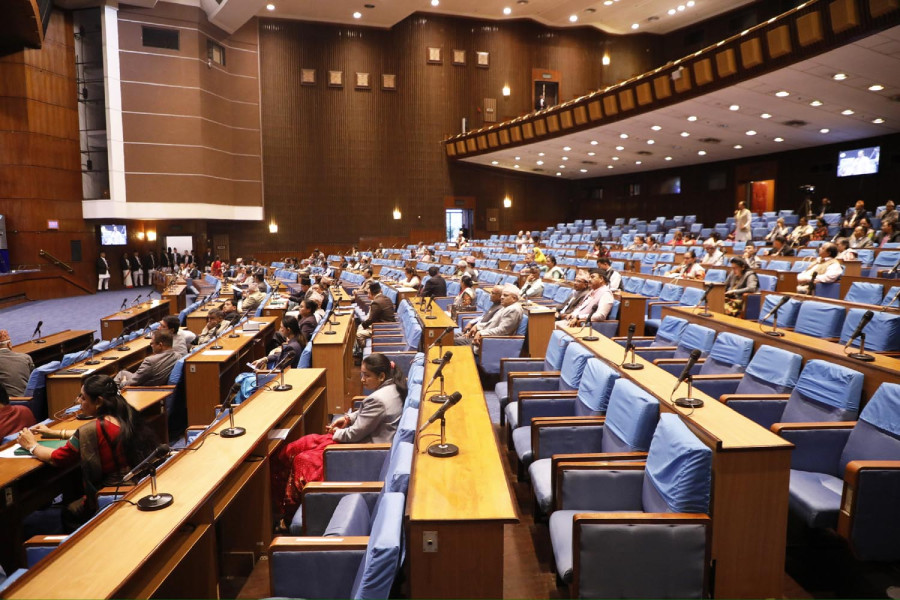Politics
House session ending amid Maoist-UML war over a word
Government asks President to prorogue Parliament session with effect from Monday midnight.
Binod Ghimire
The government has decided to prorogue the House session amid ongoing demands by the main opposition CPN (Maoist Centre) to remove the term ‘violence’ from parliament records and failed attempts at resolution.
The House of Representatives meeting was adjourned on Sunday following the decision of the Maoist Centre to continue the House obstruction until the statement of a CPN-UML leader was erased from Parliament’s records. Later in the evening, the Cabinet recommended the President to prorogue the ongoing session of the House of Representatives as well as the National Assembly with effect from Monday midnight, according to government spokesman and information minister, Prithvi Subba Gurung.
The Maoist party is demanding that the term ‘violence’ used to describe the decade-long Maoist insurgency be removed.
Despite Speaker Devraj Ghimire meeting the chief whips and whips of major parties prior to the House meeting slated for 1 pm on Sunday, the discussions ended without resolution. The main opposition insisted that removal of the term from the Parliament’s record was a must for the party to end the obstruction.
The dispute started on August 28, when UML Secretary Yogesh Bhattarai, while speaking in the lower house, described the Maoist insurgency as “unfortunate” and said Nepal’s hydropower sector would have progressed long ago had several electricity infrastructures not been destroyed by then-rebel Maoists. He had argued that Maoist “violence” made the country lag behind in electricity development.
Maoist lawmakers had promptly objected to his statement arguing that terming the “people’s war” as “violence” is an affront to the constitution. They demanded expunging the word from parliamentary records. They allowed the House to function only after Ghimire promised to address their concerns after reviewing the issue.
Last Wednesday, Speaker Ghimire announced that the term “violence” was not unparliamentary. He ruled that the word ‘violence’ does not qualify to be termed unparliamentary, citing the parliamentary regulations 2022, the discussions held at a meeting of the Business Advisory Committee, and the Parliament Secretariat’s opinion. Therefore, it would not be removed from official records, he said.
Maoist lawmakers objected to the Speaker’s decision, called it biased, and resorted to obstructing the House. A parliamentary party meeting of the third largest party on Friday concluded that terming “people’s movement” as violence was an attempt to demean the party and set the removal of the word from parliamentary records as its bottom line for lifting the obstruction.
Maoist Centre chief whip Hit Raj Pandey reiterated the party’s position in the meeting called by Ghimire on Sunday. “The Speaker said that his decision is based on parliament regulations,” said an aide to Ghimire, adding the regulations clearly say that the Speaker’s decision will be final in such matters.
Talking to the media after the meeting with the Speaker, Pandey said any attempt to demean the glorious ‘people’s war’ is unacceptable. “It’s not just about a word. It’s about the intent to vilify the people’s war,” said Pandey. The Maoist Centre held its internal meeting, after the inconclusive dialogue with the Speaker, and decided to stick to its position.
A group of Maoist Centre leaders including Barsha Man Pun and Janardan Sharma met the Speaker in the afternoon to inform him that they would continue the obstruction. They also had complained to the Speaker about his ‘unilateral’ decision. The Speaker, however, maintained that the decision was fair.
Sunday’s meeting of the lower house was supposed to endorse the bill relating to legislation management. Similarly, UML lawmaker Surya Thapa-led committee was scheduled to present its report on the cooperatives fraud at the meeting.
The Maoist Centre has been maintaining that the constitution has validated the people’s war and calling it ‘violence’ is disrespect to republicanism, federalism and constitution. “It is unconstitutional to label the people’s movement ‘violence’. Parliament will not function until this matter is resolved,” said Pandey.
The ruling parties, however, say that the Maoist Centre is demonstrating its disdain for the parliamentary process by refusing to abide by the Speaker’s reasoned decision.
“The Maoist Centre is showing that it doesn’t have faith in the parliamentary process. It is the responsibility of the parties to abide by the Speaker’s ruling,” said Mahesh Bartaula, the UML chief whip. “Continuous House obstruction is only going to cost the party dearly."




 13.12°C Kathmandu
13.12°C Kathmandu














